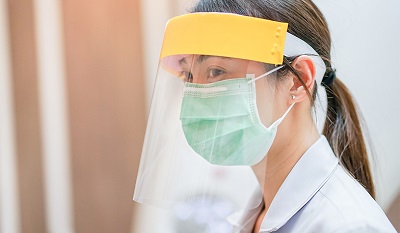At the webinar on “ Global Epidemic Control: Challenges and Opportunities for Medical Plastic Manufacturing” held on 22-23 June 2020 and organised by Ringier Events, Mr. Daniel Tanzil, the Country Manager of Milliken Indonesia presented on Milliken’s innovative additive solutions for various sectors like packaging and medical/healthcare, with emphasis on the role of advanced material solutions in epidemic control.
The presentation began with an overview of the ASEAN region and how the region has been suffering from the rapid spread of the coronavirus. The travel restrictions and lockdown situations have somewhat eased but social distancing has been the new norm. The demand for personal protective equipment (PPE) has been sustained, owing to the need for safety and precautionary measures in order to avoid contamination.
Milliken has leveraged its unique capabilities to help produce needed medical PPEs amid the COVID-19 pandemic. For the production of protective face shields, manufacturers offer the readily available polypropylene plastic. The material, however, is naturally hazy, so plastic manufacturers are turning to Milliken and the company’s NX® UltraClear™ polypropylene concentrate to produce plastics with clarity levels suitable for healthcare industry face shields.

Milliken has collaborated with a number of plastic manufacturers, from global players to regionally based companies, to evaluate NX® UltraClear™ in this new product application. Impact Plastics is among the U.S. companies using NX® UltraClear™ concentrates to make polypropylene clear for use in face shields. Mezger in Germany is also employing NX® UltraClear™ concentrates to produce polypropylene sheet suitable for use in face shields. Medical face shields made with NX® UltraClear™ polypropylene are now in the market and being used by front-line workers.
Solving the issues with PP
In the production of face shields in particular, polypropylene (PP) has become a common material as it is readily available in Asia, but the issue with PP is clarity. PP is lighter, too, as compared with PET or PPC. Mr. Tanzil states that with Millad® NX® 8000: clarifier for PP, Milliken has been able to solve that issue. Moreover, since PP is around 30% lighter than other materials like PET or PPC, it is more convenient to wear PP face shields for a longer duration. Lastly, PP also has good heat resistant property, so disinfecting it using boiling water or steamer is possible without distorting or damaging the face shields.
For the PPE production, Milliken has innovated to ensure that face masks meet the stringent health standards for protection. For the filter layer in the mid-section of the mask which is made from melt-blown fibre, Milliken offers three additives to improve the physical filtrations and also the electro-static filtrations. These additives enable the production of softer filters that don’t turn yellowish and of better quality.
In the production of face masks, Mr. Tanzil stated that Milliken has made available its additives solution to improve the filter layer in the middle of the mask which is made from melt-blown fibre. The Milliken additives helped enhance the physical filtrations and also the electro-static filtrations. The filter with Milliken additive is softer and performs better, without it being yellowish as compared with others in the market.
For injection moulded medical products, such as syringe, the shift from glass to plastic as material for syringe tubes has also created demand for additives that will improve the quality and clarity of the injection moulded syringe tube. As Mr. Tanzil explained, China dominates the global production for syringe but there is also opportunities for ASEAN manufacturers to produce syringe tube in their countries. He also went to explain how Millad® NX® 8000 has been the standard for syringe manufacturing in China and Japan.
With the excellent solubility of Millad® NX® 8000, the appearance of bubbles on the syringe has been eliminated. In previous production of syringe, one can see voids or bubbles on the pots of the syringe. To avoid this, Millad® NX® 8000 can be applied which will also improve the clarity of the syringe tube. If the goal is to produce premium syringe, the recommended upgrade can be achieved with NX® UltraClear™.














